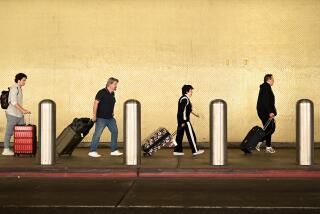Advice From the Guru: Keep On Truckin’
This column is published at a time when some are suggesting that we Americans should reduce our travels, at least to other parts of the world. While we all can understand the anxieties that generate such advice, it is important that we pause to consider the importance of travel.
I have long written that travel--and especially international travel--has become an essential part of a civilized life. It has gained this status from the choices that multitudes of people have made, for we are the first generation in human history that now visits other continents as casually as people used to go to a neighboring village.
Before the tragic events of Sept. 11, it seemed that the distinction between domestic and international travel was gradually being obliterated, that people were going to London as easily as they traveled to Los Angeles.
In every gathering, on countless occasions, you came upon this exhilarating new sense of what travel had become. You met friends at a party, and they asked: “Should we vacation this winter in Florida or in Australia? Should we go to New Orleans or to Buenos Aires?”
The ability to travel to remote and different parts of the world is too precious to be lightly abandoned.
It has become so enriching an experience that it should be hotly defended through our personal decisions on how to spend our leisure time.
This tribute to the rewards of travel is no afterthought on my part, conceived after the events of the past three weeks. As early as spring 1998, I stated in my travel magazine that “travel is part of a civilized life, far too important to be limited” by the obstacles we outlined in that publication. “Travel,” I said in another issue of the same journal, “is an important, basic human right.”
“Travel, in our view, is not simply a playful recreation,” I wrote in January 2000. “It is a vital tool for understanding the world, acquiring greater awareness of other possibilities, communicating with those of other ideas or cultures.”
Though you might devour every journal of opinion and analysis, read endless political commentaries, follow every news show, there is nothing quite like the experience of going to other locales for the learning and insight it brings.
In November 1999, I wrote, “Travel is the way we educate ourselves about the world, observe the realities of life in other places, gain the knowledge we need to make important judgments about new social measures and our own nation’s foreign policy.”
And beyond the greater understanding that travel brings to our decisions as citizens and our intellectual growth as people, travel is also important to our spiritual life. “Once every winter,” I wrote in December 1998, “in an ideal world, all human beings would stand waist-deep in bathtub-warm Caribbean waters and cleanse their minds of petty anxieties and irritations. They would romp with their children, to laughs and shouts, on a soccer field of St. Maarten, or wiggle their hips to the reggae rhythms of a loudspeaker-blaring record store in Montego Bay. Once every winter, from a pier off the shores of Tahiti, Fiji or Maui, they would gaze lazily at small tropical fish and undersea coral. And they would stare, transfixed, at the great Mayan ruins of the Yucatan, or fall into reveries while pondering the nighttime bowl of the universe from a moonlit beach of Bonaire.”
If you share these views about the importance of travel, you will now determine to continue traveling. You will not permit your life to be narrowed by close-minded fanatics. You will continue to pursue and enjoy a civilized life, of which travel is an essential part.
More to Read
Sign up for The Wild
We’ll help you find the best places to hike, bike and run, as well as the perfect silent spots for meditation and yoga.
You may occasionally receive promotional content from the Los Angeles Times.






